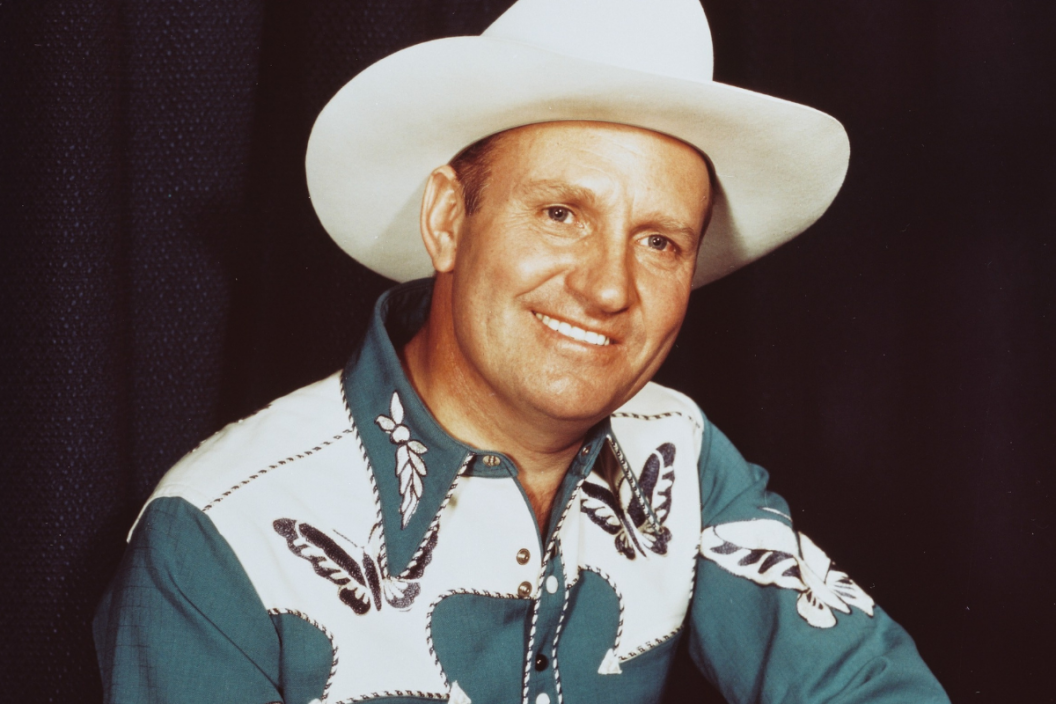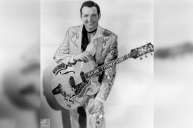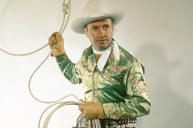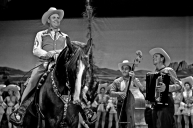As the king of the singing cowboys, Gene Autry shaped how country singers looked and sounded in the era of radio stars and beyond. Along the way, he introduced country music to a broader audience by impacting our Christmas music playlists and playing a live-action hero in Hollywood.
Videos by Wide Open Country
The Singing Cowboy
The music career of Tioga, Texas native Orvon Grover "Gene" Autry (Sept. 29, 1907-Oct. 2, 1998) began in the late 1920s. Allegedly, the humorist Will Rogers heard Autry singing on the job and suggested he ditch his telegrapher gig for showbiz.
Autry started as a star for a Tulsa radio station before signing with Columbia Records in 1929. His deal came a year after getting turned down by Victor following an audition in New York.
After dabbling in "hillbilly" music with Jimmy Long and other collaborators in major radio markets like Chicago, Autry found chart success in 1932 with one of his best-known co-writes and the first-ever certified gold record (depending on the source), "That Silver-Haired Daddy of Mine." Across his career, Autry had a hand in writing around 300 songs. He also covered a lot of western standards like "Tumbling Tumbleweeds," "Take Me Back to My Boots and Saddle," "Red River Valley" and "Back in the Saddle Again" for his records and films. His crooner-quality vocal delivery also made for great covers of "You Are My Sunshine," "Have I Told You Lately That I Love You?" and other popular standards.
A Yuletide Legend
Autry's lasting impact on western style and country music can still be heard every December. To children of all ages, Autry is the singer of "Rudolph the Red-Nosed Reindeer." The song, based on a character created in 1939 by Robert L. May, further popularized a tale that's now a permanent part of Christmas lore. While that 1949 single alone would make Autry a yuletide legend, it's not his only contribution to the American holiday songbook. He wrote another song that seems like it shouldn't be less than 100-years-old, "Here Comes Santa Claus." The cowboy movie icon also helped popularize Frosty the Snowman and a character associated with a different holiday on the calendar, Peter Cottontail.
A Live-Action Super-Hero
Read More: Check Out Gene Autry's Bizarre Sci-Fi Serial, 'The Phantom Empire'
At a time when western stars outshone super-heroes at the box-office and even had their own comic books, Autry captured the imagination of kids from coast-to-coast. His big-screen and small-screen work in the 1930s and beyond further promoted his music, as well. Unlike predecessor Jimmie Rodgers or successor Hank Williams, Autry could lend his face to a song like "Mexicali Rose," the title track from a 1939 South of the Border adventure.
Despite taking a break to serve in the military during World War II, Autry starred in a whopping 93 films between 1934 and 1953--including his Mascot/Republic Pictures debut In Old Santa Fe and the bizarre sci-fi serial The Phantom Empire. Many of his movies paired Autry with a fellow country singer from his radio days, Smiley Burnette.
As if motion picture success wasn't enough, Autry rode into America's living rooms on his horse Champion as the star of the CBS radio show Gene Autry's Melody Ranch (1940-'56) and a television series, The Gene Autry Show (1950-'56). Such TV programs, paired with prime time variety shows, introduced country music to viewers of all ages.
For the various roles he successfully played throughout his public life, Autry's name resides in the Country Music Hall of Fame, the Nashville Songwriter's Hall of Fame and the National Cowboy and Western Heritage Museum. He's also got a star on the Hollywood Walk of Fame, a retired number as the longtime owner of Major League Baseball's Los Angeles Angels and (top this, Roy Rogers) an entire city bearing his name in Oklahoma.
This article was originally published in September of 2018.
Editor's Note: Products featured on Wide Open Country are independently selected by our editors. However, when you buy something through our links, we may earn a commission




